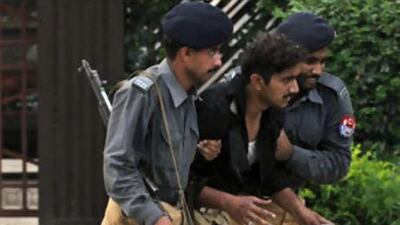ISLAMABAD // A suicide bomber marked the first anniversary of a military operation against Islamabad's radical Red Mosque yesterday by targeting police guarding the site, killing at least 10. The unofficial death toll stood at 19 last night, with nine policemen among them. There were more than 30 injured. A bomber wearing a suicide vest walked up to a group of police officers stationed a couple of hundred metres from the Red Mosque at about 8pm, and detonated his vest.
Bashir Shaheen, a retired soldier who lives close by, said he saw body parts scattered across the area. Arms, legs and torsos were seen up to 50 metres away. "They [the injured] were moaning, some were screaming for help," Mr Shaheen said. Police helmets, jackets, shields and protective vests were left lying amid pools of blood. The attack came after a highly charged day in which thousands of people, mostly young religious students, gathered at the Red Mosque, in central Islamabad, to mark the day one year ago when security forces stormed the complex, killing at least 100.
The raid had followed a weeklong stand-off that began when gunmen from the mosque clashed with police outside. The mosque's hardline clerics and supporters had waged a violent campaign to enforce Taliban-style rule, kidnapping women they accused of prostitution and some policemen, and storming music and video shops and beauty parlours. They also accumulated weapons at the complex in the heart of the capital and battled security forces for days, rejecting appeals to surrender, after the siege began.
Speakers told the crowd that Pervez Musharraf, the Pakistani president, was to blame for the bloodshed. A huge police cordon had been thrown around the site yesterday. The police targeted by the bomber were positioned in the outermost ring of security. Kamran Adil, a senior police official, said his men were the target and most of the more than 10 victims were police. "Police were going back to their stations when it happened," Mr Adil said. "We picked up more than 10 bodies;, there are also many wounded, most of them police. The primary target was our men."
Yasmeen Bobby, who came to the scene shortly after the blast, said she saw half a body lying on the roadside, a torso and head. "Bodies were lying everywhere," she said. The bomber is thought to have used an explosive vest packed with ball-bearings that can shred into body tissue to cause maximum injury. Bystanders said the impact of the blast caused nearby buildings to shake. Mohammad Iqbal, a motorcyclist who arrived after the blast, said: "They are not humans who do this. Islam does not allow it."
The raid on the Red Mosque sparked a vicious campaign of suicide bombings across Pakistan, aimed mostly at the police and army, but peace talks with militants opened by the new civilian government had led to a reduction in the attacks. However, last month a deadly explosion at the Danish Embassy in Islamabad had shown that an intractable element among the militants had decided to continue the violence. Al Qa'eda claimed responsibility for the embassy bombing.
In Pakistan, it is widely believed that up to 3,000 died in the Red Mosque operation, mostly girls studying at the adjacent seminary, and their bodies were buried in secret graves. Belief in that conspiracy has made the Red Mosque one of the central political issues in Pakistan, with anger still raw over the raid - it is thought to be one of the main reasons why the allies of Mr Musharraf, who ordered the operation, were punished at the elections in February.
No group or person has claimed responsibility for yesterday's blast. But Rehman Malik, the interior ministry chief, said the bomber was a man in his mid-thirties with a small beard. "We have found the upper part of the suicide bomber," he told Geo Television. Mr Malik, who was quick to arrive at the site of the blast, said the country has to think "who is destabilising our country" and take action.
"We have to take them out from our ranks," he said. "We have to combat them." With additional reporting by Reuters sshah@thenational.ae

